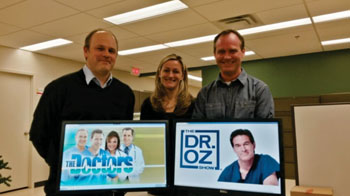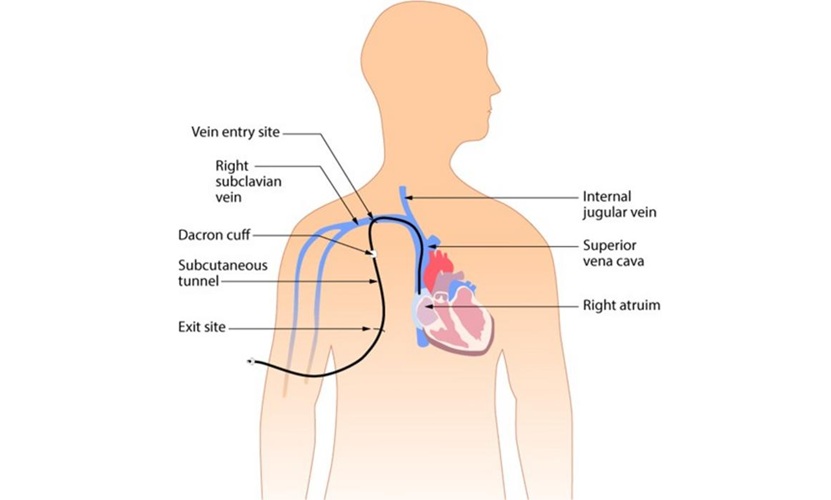Viewers Cautioned on Televised Medical Talk Show Recommendations
|
By HospiMedica International staff writers Posted on 05 Jan 2015 |

Image: Study authors Mike Kolber, Christina Korownyck, and Mike Allan (Photo courtesy of the University of Alberta).
A new study warns that the public should be skeptical of recommendations made on mainstream television medical talk shows, as they often lack adequate evidence or are contradicted by the best available evidence.
Researchers at the University of Alberta (Edmonton, Canada) chose two internationally syndicated medical talk shows to analyze: The Dr. Oz Show and The Doctors. Each show was recorded every day from January 2013 to April 2013. The researchers then randomly selected 40 episodes of each show and had two team members watch every episode independently, recording topics, recommendations made, and who was making the recommendations. Two other researchers also watched the episodes and review the recommendations, focusing on benefits mentioned, if the magnitude of the benefit was quantified, costs, and conflict of interest.
The researchers found evidence to support 54% of the 160 randomly selected recommendations (80 from each show). For The Dr. Oz Show, evidence supported 46%, contradicted 15%, and was not found for 39%. For The Doctors, evidence supported 63%, contradicted 14%, and was not found for 24%. Believable or somewhat believable evidence supported 33% of the recommendations on The Dr. Oz Show and 53% on The Doctors. The most common recommendation category on The Dr. Oz Show was dietary advice (39%) and on The Doctors was to consult a healthcare provider (18%).
Further findings included a specific benefit for 43% and 41% of the recommendations made on the shows respectively. The magnitude of benefit was described for 17% of the recommendations on The Dr. Oz Show and 11% on The Doctors. Disclosure of potential conflicts of interest accompanied only 0.4% of recommendations for both shows. The study was published in the Christmas edition of the British Medical Journal (BMJ), which was dedicated to media studies.
“Some patients come in and say 'I heard on Dr. Oz yesterday that we should all be doing this.' And then we're left scrambling in our office to try to find answers. It got us reflecting, what's being said there? What kinds of things are being recommended and what kind of information is being provided?” said lead author Christina Korownyk, MD, an associate professor in the department of family medicine. “Frequently you're not getting enough information and without doing the research you won't know if it's supported by evidence or not; the research supporting any of these recommendations is frequently absent, contradictory, or of poor quality.”
Related Links:
University of Alberta
Researchers at the University of Alberta (Edmonton, Canada) chose two internationally syndicated medical talk shows to analyze: The Dr. Oz Show and The Doctors. Each show was recorded every day from January 2013 to April 2013. The researchers then randomly selected 40 episodes of each show and had two team members watch every episode independently, recording topics, recommendations made, and who was making the recommendations. Two other researchers also watched the episodes and review the recommendations, focusing on benefits mentioned, if the magnitude of the benefit was quantified, costs, and conflict of interest.
The researchers found evidence to support 54% of the 160 randomly selected recommendations (80 from each show). For The Dr. Oz Show, evidence supported 46%, contradicted 15%, and was not found for 39%. For The Doctors, evidence supported 63%, contradicted 14%, and was not found for 24%. Believable or somewhat believable evidence supported 33% of the recommendations on The Dr. Oz Show and 53% on The Doctors. The most common recommendation category on The Dr. Oz Show was dietary advice (39%) and on The Doctors was to consult a healthcare provider (18%).
Further findings included a specific benefit for 43% and 41% of the recommendations made on the shows respectively. The magnitude of benefit was described for 17% of the recommendations on The Dr. Oz Show and 11% on The Doctors. Disclosure of potential conflicts of interest accompanied only 0.4% of recommendations for both shows. The study was published in the Christmas edition of the British Medical Journal (BMJ), which was dedicated to media studies.
“Some patients come in and say 'I heard on Dr. Oz yesterday that we should all be doing this.' And then we're left scrambling in our office to try to find answers. It got us reflecting, what's being said there? What kinds of things are being recommended and what kind of information is being provided?” said lead author Christina Korownyk, MD, an associate professor in the department of family medicine. “Frequently you're not getting enough information and without doing the research you won't know if it's supported by evidence or not; the research supporting any of these recommendations is frequently absent, contradictory, or of poor quality.”
Related Links:
University of Alberta
Channels
Artificial Intelligence
view channelCritical Care
view channel
New Clinical Guidelines to Reduce Central Line-Associated Bloodstream Infection
Central venous catheters are essential in intensive care units, delivering life-saving medications, monitoring cardiovascular function, and supporting blood purification. However, their widespread use... Read more
New Inhalable Treatment for TB Lowers Side Effects
Tuberculosis (TB) remains one of the world’s deadliest infectious diseases, despite being curable. Treatment requires months of multiple drugs that can cause serious side effects, leading many patients... Read moreSurgical Techniques
view channelAI-Based OCT Image Analysis Identifies High-Risk Plaques in Coronary Arteries
Lipid-rich plaques inside coronary arteries are strongly associated with heart attacks and other major cardiac events. While optical coherence tomography (OCT) provides detailed images of vessel structure... Read moreNeural Device Regrows Surrounding Skull After Brain Implantation
Placing electronic implants on the brain typically requires removing a portion of the skull, creating challenges for long-term access and safe closure. Current methods often involve temporarily replacing the skull or securing metal plates, which can lead to complications such as skin erosion and additional surgeries.... Read morePatient Care
view channel
Revolutionary Automatic IV-Line Flushing Device to Enhance Infusion Care
More than 80% of in-hospital patients receive intravenous (IV) therapy. Every dose of IV medicine delivered in a small volume (<250 mL) infusion bag should be followed by subsequent flushing to ensure... Read more
VR Training Tool Combats Contamination of Portable Medical Equipment
Healthcare-associated infections (HAIs) impact one in every 31 patients, cause nearly 100,000 deaths each year, and cost USD 28.4 billion in direct medical expenses. Notably, up to 75% of these infections... Read more
Portable Biosensor Platform to Reduce Hospital-Acquired Infections
Approximately 4 million patients in the European Union acquire healthcare-associated infections (HAIs) or nosocomial infections each year, with around 37,000 deaths directly resulting from these infections,... Read moreFirst-Of-Its-Kind Portable Germicidal Light Technology Disinfects High-Touch Clinical Surfaces in Seconds
Reducing healthcare-acquired infections (HAIs) remains a pressing issue within global healthcare systems. In the United States alone, 1.7 million patients contract HAIs annually, leading to approximately... Read moreBusiness
view channel
Medtronic to Acquire Coronary Artery Medtech Company CathWorks
Medtronic plc (Galway, Ireland) has announced that it will exercise its option to acquire CathWorks (Kfar Saba, Israel), a privately held medical device company, which aims to transform how coronary artery... Read more
Medtronic and Mindray Expand Strategic Partnership to Ambulatory Surgery Centers in the U.S.
Mindray North America and Medtronic have expanded their strategic partnership to bring integrated patient monitoring solutions to ambulatory surgery centers across the United States. The collaboration... Read more
FDA Clearance Expands Robotic Options for Minimally Invasive Heart Surgery
Cardiovascular disease remains the world’s leading cause of death, with nearly 18 million fatalities each year, and more than two million patients undergo open-heart surgery annually, most involving sternotomy.... Read more
















